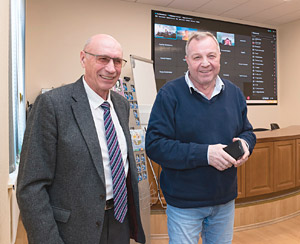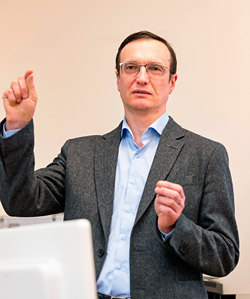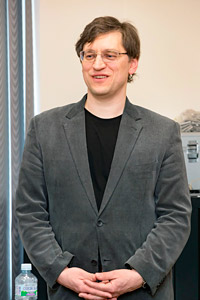
Electronic english version since 2022 |
The newspaper was founded in November 1957
| |
|
Number 16 (4613) |
Seminars
Two fifties or Thirty years with JINR
On 14 April, FLNP hosted a joint laboratory seminar "Two fifties or Thirty years with JINR", dedicated to the fiftieth anniversaries of V.I.Bodnarchuk and M.V.Avdeev. The event brought together the colleagues and friends of the heroes of the day in the FLNP Conference Hall, yet some of them took part in the online seminar. The celebrants presented their reports: "Special methods of neutron time-of-flight reflectometry and their implementation on the IBR-2 pulsed source" - V.I.Bodnarchuk, "Neutron scattering in the study of complex colloids in bulk and at interfaces"- M.V.Avdeev.
 Opening the seminar, FLNP Director V.N.Shvetsov noted that the event was very positive, "After two years of COVID-19 restrictions, we have found a good opportunity to gather among the Laboratory staff members "to celebrate the 50th anniversary of two of our young colleagues." COVID-19 nevertheless made its amendment - Viktor Ivanovich Bodnarchuk turned 50 on 24 October, 2021 during the anti-COVID restrictions, the celebration was decided to postpone and combine it with the anniversary of Mikhail Vasilyevich Avdeev on 14 April, 2022.
Opening the seminar, FLNP Director V.N.Shvetsov noted that the event was very positive, "After two years of COVID-19 restrictions, we have found a good opportunity to gather among the Laboratory staff members "to celebrate the 50th anniversary of two of our young colleagues." COVID-19 nevertheless made its amendment - Viktor Ivanovich Bodnarchuk turned 50 on 24 October, 2021 during the anti-COVID restrictions, the celebration was decided to postpone and combine it with the anniversary of Mikhail Vasilyevich Avdeev on 14 April, 2022.
"This is not a summing up," V.I.Bodnarchuk began his report. "I will talk about the main topics that I have had to work on during 30 years and about the groundwork for the future. My first acquaintance with JINR took place in 1992, at that time I met D.A.Korneev, in whose group I later worked. And my first task was to study the Berry phase during the evolution of the neutron spin in a magnetic field on the REMUR reflectometer, which then was called SPN.
 Later, the task of observing the effect of nonspecular neutron reflection occurred. A significant part of V.I.Bodnarchuk's activity involved the REFLEX and GRAINS reflectometers. REFLEX has upgraded, today nothing of the previous configuration has remained. For many years, methodical developments of the spin-echo method have been carried out on it. Viktor Ivanovich went all the way with the GRAINS reflectometer: from the discussion of the idea itself, through the complex dismantling of the KDSOG facility to the launch of the reflectometer in 2013. A range of activities on the study of lithium batteries was implemented on the GRAINS reflectometer. The last works of the hero of the anniversary are dedicated to the study of background conditions on the IBR-2 reflectometers and simulation of the neutron filter in the VITESS package.
Later, the task of observing the effect of nonspecular neutron reflection occurred. A significant part of V.I.Bodnarchuk's activity involved the REFLEX and GRAINS reflectometers. REFLEX has upgraded, today nothing of the previous configuration has remained. For many years, methodical developments of the spin-echo method have been carried out on it. Viktor Ivanovich went all the way with the GRAINS reflectometer: from the discussion of the idea itself, through the complex dismantling of the KDSOG facility to the launch of the reflectometer in 2013. A range of activities on the study of lithium batteries was implemented on the GRAINS reflectometer. The last works of the hero of the anniversary are dedicated to the study of background conditions on the IBR-2 reflectometers and simulation of the neutron filter in the VITESS package.
"I got interested in physics in high grades, my elder brother who studied at the Moscow Institute of Physics and Technology was an outstanding example," the hero of the day told our correspondent. "There was no matter of choosing a specialty, it was necessary to identify the appropriate university for admission. After thinking, I decided to enter MEPhI at the Faculty of Experimental and Theoretical Physics. I graduated from the Institute in 1994. It was a difficult time for the country, there was a collapse of the Soviet Union, the collapse of the distribution system for young specialists. I remember that winter day in December 1993 when I first came to Dubna. Dmitry Anatolyevich Korneev met me at the entrance checkpoint and took me to his room, where we discussed what I could work on in the Laboratory. He just had a very interesting task concerning the fundamental properties of the neutron. He was so fired up with it that he suggested to me: let's try. And instead of the subject of detectors, I plunged into the depths of quantum mechanics, into the study of the wave properties of the neutron at the IBR-2 reactor. It should be mentioned that it was an interesting period then, it was not clear what was going on in the country, the payment of salaries was delayed, but our work was in full swing, everyone was very passionate about it. D.A.Korneev was a creative person who was interested in both fundamental problems and methodical tasks. Working under his supervision, I began to develop professionally. I got acquainted with the methods, gradually adopted all the rich experience that Dmitry Anatolyevich had accumulated while designing facilities at the IBR-2 reactor.
I can say that it was due to this experience that all my subsequent work in the field of research methods with polarized neutrons was carried out. In this sense, Dmitry Anatolyevich Korneev is my biggest teacher, who opened the way for me to experiments with neutron scattering. When I came to his group, the construction of the new reflectometer with polarized neutrons REFLEX was nearing completion. It was necessary to carry out a lot of methodological work in order to put the new facility into operation. Perhaps that is why in the future most of my efforts refer the methodical aspects of developing neutron scattering facilities or their separate elements.
In 2020, Sergey Kulikov became Head of the city and I, unexpectedly for myself, headed the Department of the spectrometers complex IBR-2 and today I make sure that all the work that is carried out in the department and all the obligations that we have to fulfill in accordance with the thematic plan, as well as our own should be successfully implemented.
I also face the task of developing new areas that would become impulses for development. In particular, we now actively work on the development of thermal neutron detectors based on a solid-state boron converter. The equipment required for it is purchased, prototypes of detectors are created and their properties are studied. Thus, we discover a new area of development.
 M.V.Avdeev first learned about JINR in 1992 from a lecture by V.L.Aksenov at the Department of Solid State Physics of MEPhI. And when he arrived in Dubna, everything turned out exactly as Viktor Lazarevich had said, starting with inexpensive and tasty meals, good computer resources support and ending with a unique scientific atmosphere. As admitted by the celebrant, he felt a shock against the background of the overview of devastation in Russia in the 1990s.
M.V.Avdeev first learned about JINR in 1992 from a lecture by V.L.Aksenov at the Department of Solid State Physics of MEPhI. And when he arrived in Dubna, everything turned out exactly as Viktor Lazarevich had said, starting with inexpensive and tasty meals, good computer resources support and ending with a unique scientific atmosphere. As admitted by the celebrant, he felt a shock against the background of the overview of devastation in Russia in the 1990s.
The first topic of M.V.Avdeev's scientific activity at FLNP - fractals, was proposed to him by the supervisor I.N.Serdyuk, in whose group he got into. The topic is extensive, fractals are found everywhere - from nuclear physics to the Universe. Later, the results obtained were used in studies on the structure of detonation nanodiamonds using the small-angle neutron scattering method, which were awarded the first JINR prize for 2015. As a member of V.L.Aksenov's team, Mikhail Vasilyevich investigated solutions of the most interesting objects - fullerenes. L.A.Bulavin, a longtime colleague of the FLNP staff (Taras Shevchenko National University of Kyiv), took part in these studies; he also regularly sent his students to the Laboratory. This activity was recognized and the research work "Structure and properties of aqueous solutions of C60 and C70 fullerenes for biological applications" was awarded the first JINR prize for 2018. Another research area is the study of ferrofluids, that possess many interesting properties. The first experiments on this topic at FLNP were carried out by Maria Balashoy at the YuMO facility, M.V.Avdeev participated in the processing of the data she had obtained. Today, a promising area - the use of ferrofluids for the treatment of cancer has developed.
"My case is very simple: I'm an excellent student, I've been interested in science since I was 10, I won a silver medal at the Olympiad, I entered MEPhI," the hero of the day answered my question about choosing a profession. "I came to Dubna, I really liked it here, I have been working since 1993. Doctor of Biological Sciences Igor Nikolaevich Serdyuk from the Institute of Protein Research RAS in Pushchino was my first research supervisor. He headed the Small Angle Scattering Group of FLNP after the death of Yuri Mechislavovich Ostanevich. In 1999, I went to Hungary for two years, where I was offered a position in charge of the small-angle scattering facility. Afterwards, I returned, defended my Ph.D. thesis and furtherly worked on my doctoral thesis, which I defended in 2012. Everything is very simple for me - there is a task, I solve it.
"When giving lectures to students, do you somehow additionally agitate them to go into science?"
"No, as I'm trying to show them that this is a regular job: if you are interested in it, you do it. There is romance here, which is difficult for the ordinary people to understand. For example, an athlete, in order to become a professional, should train routinely, practice to jabs or pass accurately and then he moves to another level and he gets into thrill. Those who are interested in the science, they are just interested and it seems to me that it is impossible to lure people into science with any advertising. To go to the next level, you have to sacrifice something and it seems to me that there are few such people. The drop-out rate is high and this is probably the major issue of the today's world science."
"Time is passing fast, it seems that just yesterday these young people were students," the FLNP Research Supervisor V.L.Aksenov spoke at the seminar. "Today they are full-fledged scientists, with their own scientific areas and students, with prospects. I want to complete the overview of their scientific research with pedagogical activity. At the Institute of Physical Problems P.L.Kapitsa had the following requirement: each staff member had to do his own scientific work, work with students and conduct social work at the Institute. Both of the celebrants fully meet these criteria. M.V.Avdeev has lectured at the Neutron Diffraction Department and for the last 10 years he has been the Deputy Head of the Department at the branch of the Scientific and Research Institute of Nuclear Physics in Dubna. V.I.Bodnarchuk has created a wonderful practicum, which S.A.Kulikov began to organise. In the last two or three years, it has become the best practice for students. Today this is especially important when we are faced with essential tasks concerning the development of a new reactor.
The Neutron Diffraction Department fulfilled its function. The graduates of the Department of Condensed Matter Research of the Laboratory constitute almost the whole department which will be developed into the Department of Fundamental Nuclear Interactions by the MSU Academic Council, the Head of which has already been approved Grigory Trubnikov.
The celebrants were warmly congratulated by the Head of the Department of Neutron Investigations of Condensed Matter Denis Kozlenko, who wished them great plans for the next fifty years. Congratulations were received from colleagues.
Olga Tarantina,
photo by Elena Puzynina